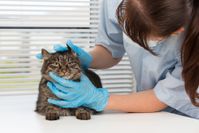
Fleas and ticks are itchy irritants for both cats and dogs. Commonly picked up in grassy fields and forests, these parasites can be much more dangerous than many pet owners are aware. They multiply quickly and spread diseases that require emergency care from a veterinarian. The following guide explains the threats fleas and ticks pose to your pet’s health, as well as the measures you can take to prevent infestation.
How Fleas & Ticks Affect Your Pet
What Are the Dangers of Fleas?
Although the most obvious sign of fleas is excessive scratching and biting, your pet may not even react to their presence at first. Those with flea bite dermatitis, an allergy to flea saliva, will experience intense itchiness. You may notice patches of red skin and hair loss from constant scratching, or in serious cases, bleeding and infections. Severe infestations on smaller pets can lead to anemia and will need to be treated by a veterinarian. Fleas can also transmit tapeworms into your pet when they are ingested, where they grow and feed on vital nutrients.
What Are the Dangers of Ticks?
 Infected ticks can bring several diseases to your unsuspecting pet depending on your location, including Lyme disease, Rocky Mountain spotted fever, and ehrlichiosis (which causes flu-like symptoms). Many of these diseases take months to surface, so as soon as your pet shows symptoms, you should take them to your veterinarian. Common signs include loss of appetite, fever, and stiffness. If not treated properly, some cases of Rocky Mountain spotted fever may be fatal.
Infected ticks can bring several diseases to your unsuspecting pet depending on your location, including Lyme disease, Rocky Mountain spotted fever, and ehrlichiosis (which causes flu-like symptoms). Many of these diseases take months to surface, so as soon as your pet shows symptoms, you should take them to your veterinarian. Common signs include loss of appetite, fever, and stiffness. If not treated properly, some cases of Rocky Mountain spotted fever may be fatal.
How Can I Protect My Pet?
Your vet may recommend flea collars, topical ointments, pills, or vaccinations, depending on your pet’s age and current lifestyle. It’s important to visit the animal clinic annually to have your cat or dog checked out for fleas and ticks. If your veterinarian discovers either, they can put your pet on a treatment plan to eliminate the parasites and treat any diseases they may have contracted.
Parasites might still be invading your home even after you rid your pet of them. Treat carpets, bedding, drapes, towels, and furniture with any commercial flea and tick remover. There are sprays for your yard, where parasites often wait for the opportunity to latch onto pets.
Has your pet shown signs of a parasitic problem? Bring them to Crescent Springs Animal Hospital, where they’ll receive the best possible care. As a premier pet hospital in Crescent Springs, KY, they offer a range of services. Whether your pet needs dental treatment, emergency care, pain management services, or behavioral counseling, their veterinarians are here to meet your furry friend’s needs. To schedule a wellness check-up, all (859) 331-6608. To see a list of their services, visit their website.
About the Business
Have a question? Ask the experts!
Send your question

